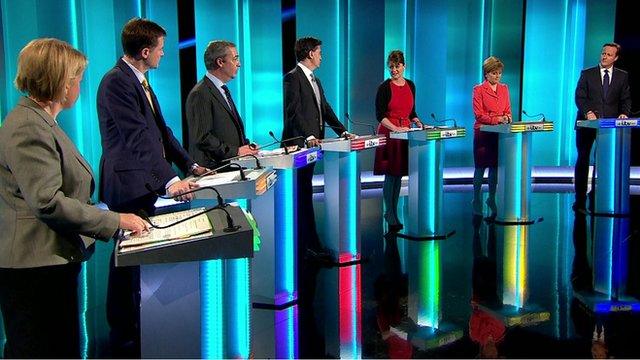Election TV debate: Parties claim spoils after seven-way battle
- Published
- comments
Party leaders have been giving their experiences of the TV debate
The Conservatives and Labour have both claimed victory in the aftermath of Thursday's TV election debate between the leaders of seven political parties.
David Cameron said he was delighted he had "come out on top" in opinion polls. Ed Miliband said the PM had "tried and failed" to defend his record.
The SNP's Nicola Sturgeon has been praised for an "impressive" performance by some senior Conservatives.
Seven million people watched the two-hour debate on ITV.
In the most high-profile event of the campaign so far, the seven politicians - also including the leaders of the Lib Dems, UKIP, the Green Party and Plaid Cymru - were questioned on a range of issues including the NHS, immigration and the deficit.
'Delighted'
In other post-debate developments:
ITV says its audience, external for the debate peaked at 7.4 million, a 33% share of the audience, compared with 9.4 million for their debate in 2010. Across ITV, BBC News and Sky the average audience was 7.7m
Snap polls taken after the poll suggested there was no clear winner
Lib Dem leader Nick Clegg said he relished the encounter and insisted his party had a "great story" to tell
UKIP has defended comments by its leader Nigel Farage over whether the NHS should treat foreign migrants diagnosed with HIV
Plaid Cymru leader Leanne Wood said she had succeeded in "speaking directly for Wales"
Conservative Chief Whip Michael Gove said Scotland, Wales and Northern Ireland could not hold separate EU referenda and a vote would be on a "UK basis"
Mr Gove says "nein danke" ("no thanks") in response to talk of a coalition with UKIP
The party leaders have returned to the campaign trail in the wake of Thursday's encounter - the only time before polling day on 7 May that Mr Cameron and Mr Miliband will share a stage.
David Cameron taunted Ed Miliband about Labour's ''zero jobs approach'
Nick Clegg: "You need to take in a balanced approach, you do need to reduce spending but you also need to ask the richest to make a contribution"
Ed Miliband accused David Cameron of ''failing'' the British people over the NHS
Nigel Farage: “We’ve got to put our own people first”
Speaking in Lancashire, Mr Cameron rejected Labour suggestions that he had been "an invisible man" during the debate, in which the party leaders locked horns over spending cuts, management of the economy, and standards of care in the NHS.
"My impression of the debate is very much there is one person, one leader, one party that is offering the competence of a long-term plan that is working and then there is a kind of coalition of chaos out there that wants more debt, spending and taxes," he said.
He added: "I was delighted with the debate. I am glad the poll of polls has got me coming out on top."
'Clear choice'
But Mr Miliband said Mr Cameron "tried and failed to defend an economy that is not working for most working people and an NHS which is failing people".
"What I think I set out was the clear choice between a Labour and a Conservative government and I am pleased I was able to do that last night."
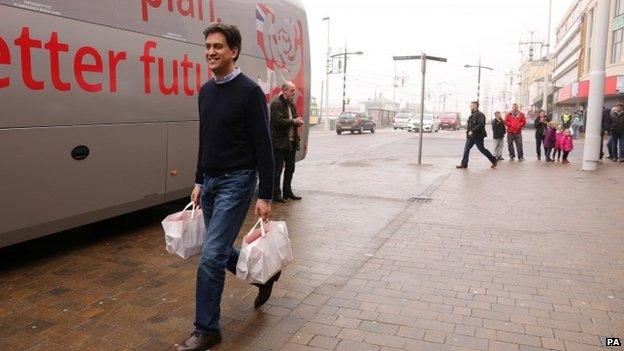
The Labour leader bought fish and chips for his press entourage in Blackpool
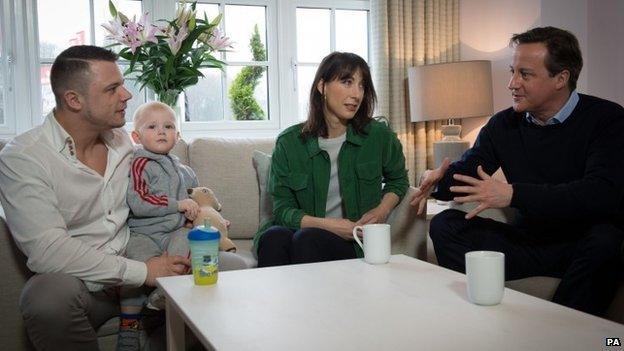
David Cameron was back on the campaign trail on Friday, accompanied by his wife Samantha
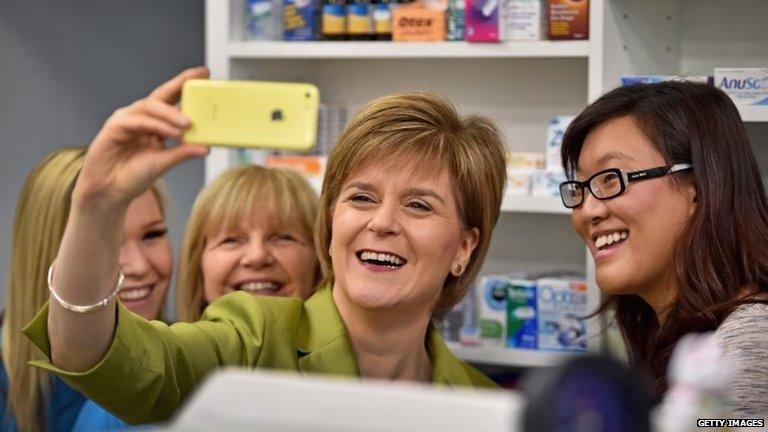
Nicola Sturgeon has been out and about in Edinburgh
As the dust settled on the encounter, both the Conservatives and Labour camps suggested their man had come out ahead.
"The overall impression people will have got is if you want to look and say 'who is the best person to lead the country over the next five years', David Cameron will have come out clearly ahead," Mr Gove told BBC Radio 4's Today programme.
But shadow energy secretary Caroline Flint suggested that Mr Cameron had "faded".
"Given that David Cameron designed and demanded this debate... he didn't seize the opportunity to make his case."
Amid suggestions of a hung Parliament and possible coalitions and deals after the election, commentators have said that the debates made the British political system look very different from the traditional two or three-party set-up.

The verdict of the snap opinion polls
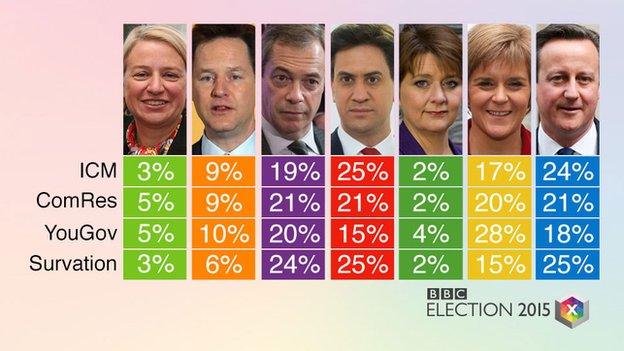

Both the Conservatives and Labour conceded that the three parties appearing in a national debate for the first time - the SNP, Plaid Cymru and Green Party - could have benefited the most from the primetime exposure.
Ms Sturgeon, Plaid Cymru leader Leanne Wood and Green leader Natalie Bennett all argued against austerity.
The SNP leader signalled areas, such as on tax, where she could work with Labour but said getting more SNP MPs elected to Westminster was needed to "keep them honest".
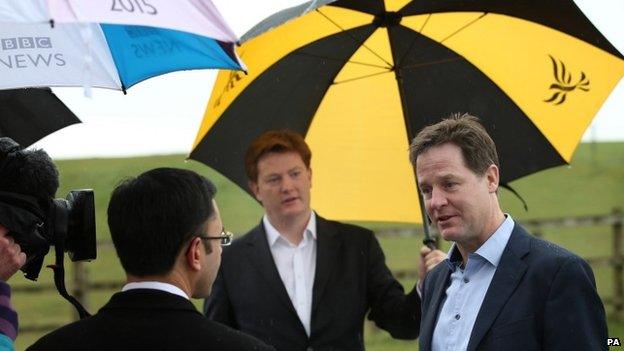
It was back to business for Nick Clegg on Friday
Speaking in Edinburgh on Friday, Ms Sturgeon said she had made the case for a "progressive change" in Scotland and across the UK.
The SNP, she suggested, could work with Labour to "lock" the Conservatives out of power but also make sure Labour did not "sell out its values" in government.
Mr Gove said the SNP leader had done "very well".
"I think it is also legitimate to say Nicola Sturgeon emerged as the most impressive debutante on the stage," he said.
Labour has suggested it is in the Conservatives' interests to talk up the SNP, as the more seats they win in Scotland, the less likely the chances of Labour getting a majority.
The BBC's assistant political editor Norman Smith said Ms Sturgeon had "managed to project herself as a distinctive, articulate voice of anti-austerity in a way which we've not really had on the national stage".
But he said both Mr Cameron and Mr Miliband's supporters were "pretty pleased" as "they felt their men came through it relatively unscathed, they got over their core message, they both believed they managed to look prime ministerial…"
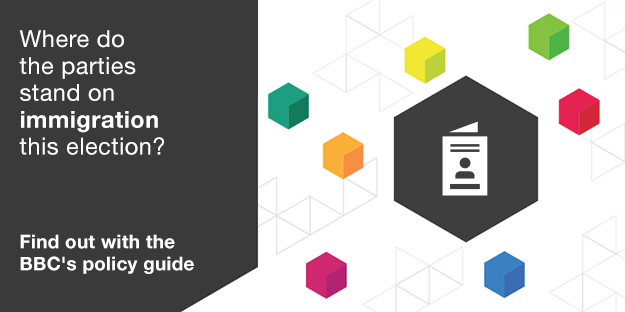
Other notable clashes during the debate came between Mr Cameron and Mr Clegg on schools funding and between the Lib Dem leader and Mr Farage over immigration.
Speaking on Friday, Mr Clegg said it was clear politics was becoming more "fragmented" and no longer a "game of pass the parcel" between the Conservatives and Labour.
"I actually think that most people watching last night will have realised no-one's going to win this election outright so it's all about who's going to work with whom," he said.
Mixed verdict
Mr Farage was attacked by his opponents after highlighting the number of foreign nationals with HIV whom he said were treated by the NHS.
But the UKIP leader defended his comments on Friday, saying the NHS "needs money to treat our people, it's not there for the whole world".
Reflecting on the debate, Mr Farage said he saw it as "UKIP against the political class".
Snap polls taken after the debate gave a mixed verdict.
A YouGov poll of 1,100 people gave a clear victory to the SNP leader Nicola Sturgeon, with 28%, followed by UKIP leader Nigel Farage on 20%, Mr Cameron on 18%, Mr Miliband on 15%, Mr Clegg on 10%, Green Party leader Natalie Bennett on 5% and Plaid Cymru's Leanne Wood on 4%.
Today asked five voters in the battleground of Bolton West to review Thursday's debate
But a ComRes poll for ITV made it a dead heat between Mr Cameron, Mr Miliband, Mr Farage and Ms Sturgeon, although Mr Cameron came out on top on the question of who was most capable of leading the country.
Mr Miliband was judged best performer in an ICM poll for the Guardian, taking 25% of support, just ahead of David Cameron on 24%.
• Subscribe to the BBC Election 2015, external newsletter to get a round-up of the day's campaign news sent to your inbox every weekday afternoon.
- Published2 April 2015
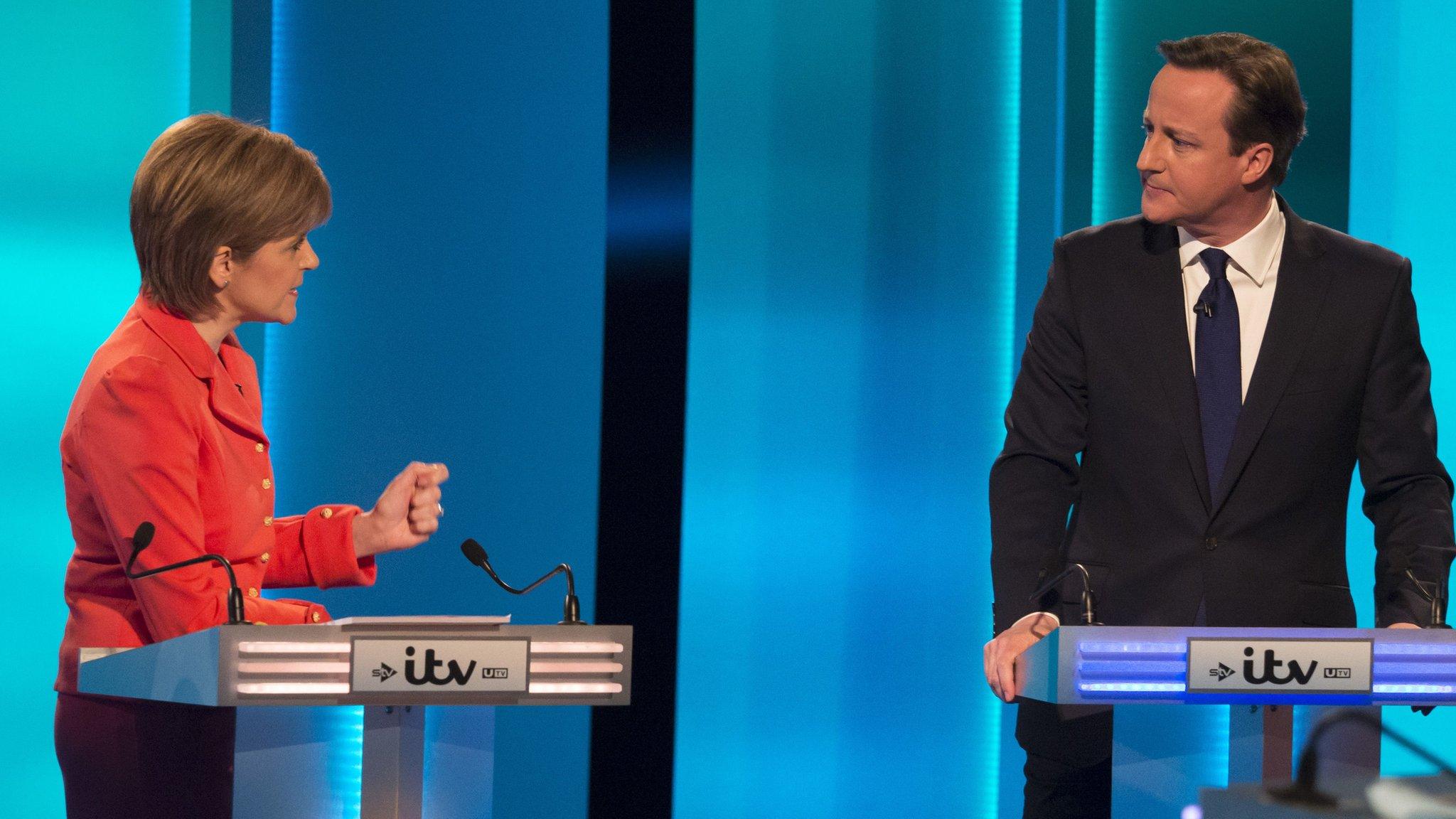
- Published3 April 2015
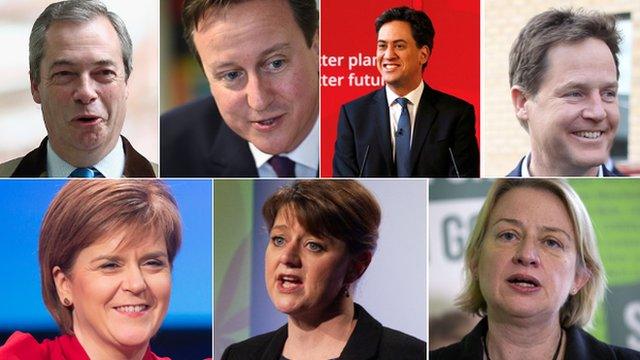
- Published3 April 2015
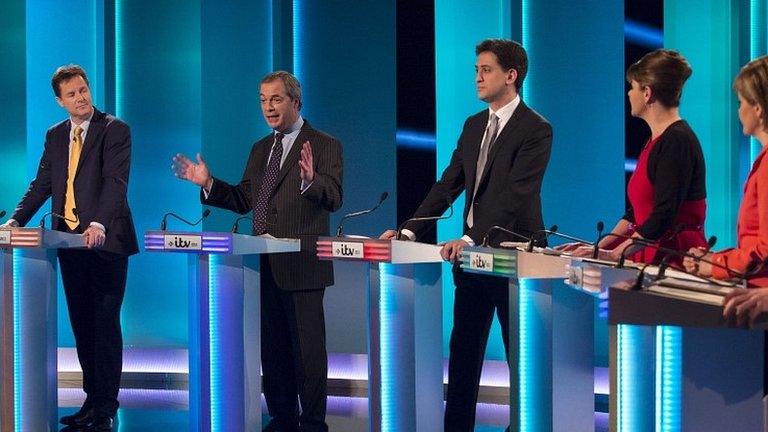
- Published2 April 2015
- Published2 April 2015
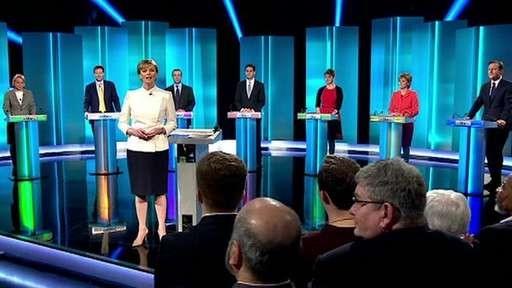
- Published3 April 2015
